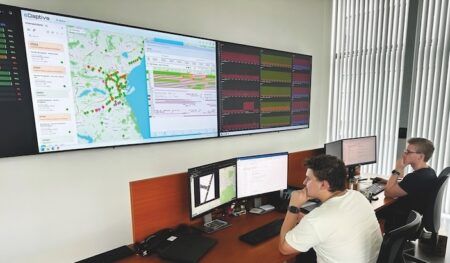A new report from University College London (UCL) provides insights about Londoners’ attitudes toward car ownership, shared mobility services, and Mobility as a Service (MaaS), as well as an impact assessment about a potential introduction of MaaS in the city.
Produced by researchers at UCL’s MaasLab, the report, Londoners’ attitudes towards car-ownership and Mobility-as-a-Service: Impact assessment and opportunities that lie ahead, was commissioned by Transport for London (TfL). According to the report, at least 35% of regular car users stated that their car usage would be changed for public transport, with 18% of trips moving to bus and 17% to tube/rail. Additionally, there would be an increased uptake of active transport modes with MaaS. Around 7% of users would swap to car sharing instead of private vehicles.
MaasLab at UCL has also expanded its MaaS Maturity Index (MMI) to help cities identify their strengths and gaps toward initiating MaaS services, and help companies identify new markets. UCL created the MMI to assess the readiness of metropolitan areas for the implementation of the MaaS concept. Various characteristics which affect the likelihood of a successful MaaS implementation are assessed to determine an aggregate score showing how ready a city is to implement MaaS. The calculator can be used to demonstrate to governments, authorities and other interested stakeholders, what improvements are needed to make a city ready for MaaS. Scores can be compared across cities, showing where MaaS providers could have the greatest impact.
The dimensions and sub-dimensions included in UCL’s index were identified through a comprehensive literature review and elicitation with MaaS experts and practitioners. The index is made up of five broad dimensions:
• Transport operators’ openness and data sharing – the extent to which transport operators share data and make API’s available to third parties, including whether data and APIs are made ‘open’ and ‘open source’;
• Citizen familiarity and willingness – the extent to which citizens’ lifestyles and behavior align with a MaaS model of transport provision, including travel behavior and use of MaaS-related technologies;
• Policy, regulation and legislation – the extent to which key policies, regulations and laws that support MaaS are in place, which may be at a city or national level;
• Transport services and infrastructure – the readiness within the current transport system for MaaS, including the variety of modes available, the density of services, the frequency of services, and the integration of services;
• ICT infrastructure – the penetration of MaaS-enabling technologies, including internet access and smart ticketing infrastructure.




